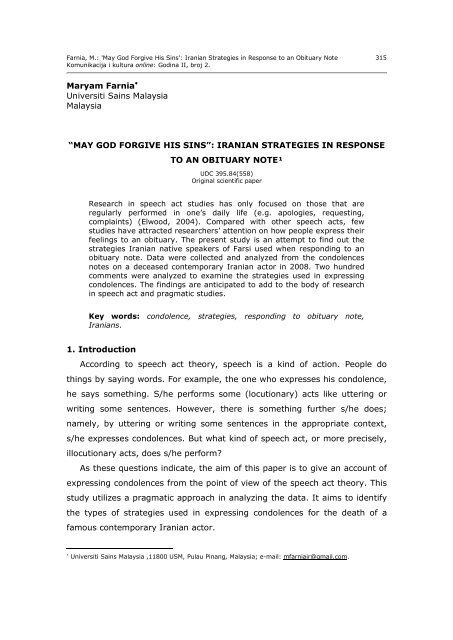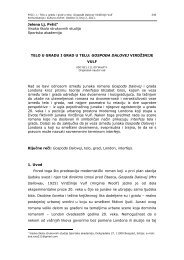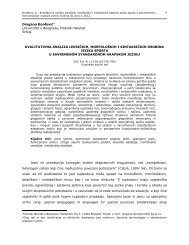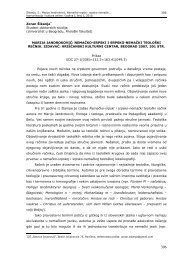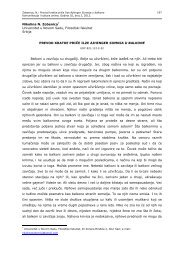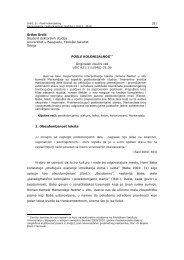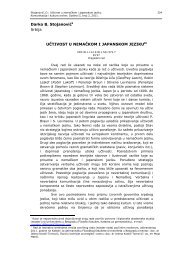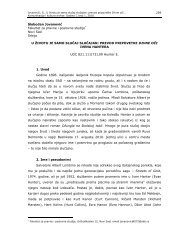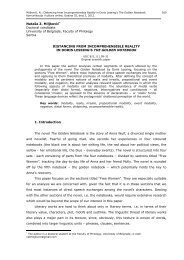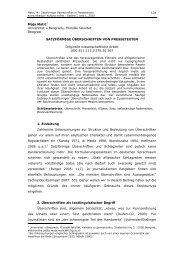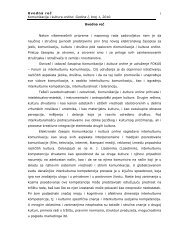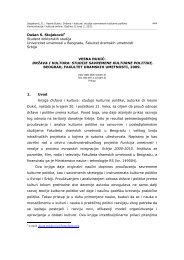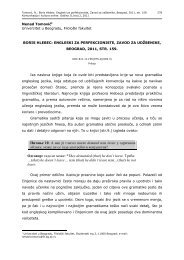'May God Forgive His Sins': Iranian Strategies - Komunikacija i ...
'May God Forgive His Sins': Iranian Strategies - Komunikacija i ...
'May God Forgive His Sins': Iranian Strategies - Komunikacija i ...
Create successful ePaper yourself
Turn your PDF publications into a flip-book with our unique Google optimized e-Paper software.
Farnia, M.: <strong>'May</strong> <strong>God</strong> <strong>Forgive</strong> <strong>His</strong> <strong>Sins'</strong>: <strong>Iranian</strong> <strong>Strategies</strong> in Response to an Obituary Note<br />
<strong>Komunikacija</strong> i kultura online: <strong>God</strong>ina II, broj 2.<br />
315<br />
Maryam Farnia ∗<br />
Universiti Sains Malaysia<br />
Malaysia<br />
“MAY GOD FORGIVE HIS SINS”: IRANIAN STRATEGIES IN RESPONSE<br />
TO AN OBITUARY NOTE¹<br />
UDC 395.84(558)<br />
Original scientific paper<br />
Research in speech act studies has only focused on those that are<br />
regularly performed in one’s daily life (e.g. apologies, requesting,<br />
complaints) (Elwood, 2004). Compared with other speech acts, few<br />
studies have attracted researchers’ attention on how people express their<br />
feelings to an obituary. The present study is an attempt to find out the<br />
strategies <strong>Iranian</strong> native speakers of Farsi used when responding to an<br />
obituary note. Data were collected and analyzed from the condolences<br />
notes on a deceased contemporary <strong>Iranian</strong> actor in 2008. Two hundred<br />
comments were analyzed to examine the strategies used in expressing<br />
condolences. The findings are anticipated to add to the body of research<br />
in speech act and pragmatic studies.<br />
Key words: condolence, strategies, responding to obituary note,<br />
<strong>Iranian</strong>s.<br />
1. Introduction<br />
According to speech act theory, speech is a kind of action. People do<br />
things by saying words. For example, the one who expresses his condolence,<br />
he says something. S/he performs some (locutionary) acts like uttering or<br />
writing some sentences. However, there is something further s/he does;<br />
namely, by uttering or writing some sentences in the appropriate context,<br />
s/he expresses condolences. But what kind of speech act, or more precisely,<br />
illocutionary acts, does s/he perform?<br />
As these questions indicate, the aim of this paper is to give an account of<br />
expressing condolences from the point of view of the speech act theory. This<br />
study utilizes a pragmatic approach in analyzing the data. It aims to identify<br />
the types of strategies used in expressing condolences for the death of a<br />
famous contemporary <strong>Iranian</strong> actor.<br />
∗ Universiti Sains Malaysia ,11800 USM, Pulau Pinang, Malaysia; e-mail: mfarniair@gmail.com.
Farnia, M.: <strong>'May</strong> <strong>God</strong> <strong>Forgive</strong> <strong>His</strong> <strong>Sins'</strong>: <strong>Iranian</strong> <strong>Strategies</strong> in Response to an Obituary Note<br />
<strong>Komunikacija</strong> i kultura online: <strong>God</strong>ina II, broj 2.<br />
316<br />
2. Review of literature<br />
Speech acts are defined as actions performed via utterances in an actual<br />
situation of language use bringing the functions the speaker intends the<br />
hearer (S) to take or to interpret. According to Austin (1962), what is said<br />
has three different meanings, i.e. locutionary (what is said), illocutionary<br />
meaning (the intended meaning) and perlocutionary meaning (the effect of<br />
one’s words on the listener).<br />
In “A classification of illocutionary act”, Searle (1976, 1-16) elaborated on<br />
the taxonomy of actions that can be performed by speaking, Searle classified<br />
five categories of speech act: 1) representatives (the description of states or<br />
events, e.g. reports, assertions, claims), 2) directives (e.g. requests, orders,<br />
suggestions, commands, inviting, i.e. asking the listener to do something in<br />
the future), 3) commisives (e.g. promises, threats, offers, swearing, i.e.<br />
committing oneself to do something in the future), 4) expressives (e.g.<br />
apologies, expressing gratitude, congratulating, i.e. expressing one’s<br />
psychological state of mind), and 5) declaratives (e.g. declaring, appointing,<br />
i.e. bringing about a change).<br />
Speech act studies have mostly focused on those which occur in one’s<br />
daily life (e.g. requests, apologies, complaints, expressing gratitude, refusal,<br />
etc.). Research on how different speech acts are realized in different cultures<br />
is useful for second language learners who wish to interact successfully in a<br />
community which is not their own. Yet there are some speech acts which<br />
have not been explored as extensively as others. The speech act of<br />
condolences is one of them. Speakers are fortunate to not be called on<br />
frequently to express sympathy after someone’s death. However, outsiders<br />
to a given culture, specifically language learners, may not know what is<br />
appropriate to say in such a context. According to Elwood (2004), this also<br />
concerns native speakers who admit they feel uncomfortable and are at a<br />
loss for words when they meet a bereaved person. Elwood (2004) further<br />
explains:
Farnia, M.: <strong>'May</strong> <strong>God</strong> <strong>Forgive</strong> <strong>His</strong> <strong>Sins'</strong>: <strong>Iranian</strong> <strong>Strategies</strong> in Response to an Obituary Note<br />
<strong>Komunikacija</strong> i kultura online: <strong>God</strong>ina II, broj 2.<br />
317<br />
“This is compounded by the fact that the news of a death may be announced<br />
without prior indication, leaving the speaker with no time to prepare.<br />
Bereavement is a time when people may be particularly vulnerable. Because of<br />
this, failure to express condolences appropriately can damage personal<br />
relationships if the expression of sympathy is perceived as insensitive or<br />
inadequate. For this reason, study of the speech act of condolences is vital.”<br />
(p.252)<br />
3. Significance of the Study<br />
One may be able to find information about how to write an obituary but<br />
not how people in different cultures write and express their condolences in<br />
response to an obituary. It might be assumed that writing and expressing<br />
condolences in such situation is derived from one’s own feeling and intuition<br />
and/or also depends on how close to the speaker the death of an individual<br />
was, but there appears to be many more issues to be considered when<br />
writing the letter of condolence. Going through the comments or notes<br />
people leave in a memorial book in different cultures and languages, one can<br />
see that besides the intimacy (where the two were friends, acquaintances,<br />
student - teacher, etc.) there is some more specific wording as to what to<br />
write and what not to write, i.e. what is acceptable and what is not. Similar<br />
to other speech acts, expressions of condolences are culturally-specific and<br />
may differ in terms of strategies people use to express their condolences<br />
across cultures. The aim of this study is also to realize the culturally-specific<br />
strategies <strong>Iranian</strong>s used in response to an obituary. It is assumed that this<br />
analysis would help to highlight the important cultural elements for a given<br />
community, i.e. Iran, when expressing condolence. This study is significant in<br />
terms of choice of speech act and population under study. Studies on speech<br />
act of condolences are rather scarce compared to other speech acts. In<br />
addition, this issue has not extensively explored among <strong>Iranian</strong> population.<br />
The main objective of this study is to figure out the strategies <strong>Iranian</strong> native<br />
speakers of Farsi use when expressing condolence.
Farnia, M.: <strong>'May</strong> <strong>God</strong> <strong>Forgive</strong> <strong>His</strong> <strong>Sins'</strong>: <strong>Iranian</strong> <strong>Strategies</strong> in Response to an Obituary Note<br />
<strong>Komunikacija</strong> i kultura online: <strong>God</strong>ina II, broj 2.<br />
318<br />
4. Background to the deceased<br />
The deceased whose notes to his obituary are analyzed is Khosro<br />
Shakibaei (March 27, 1944, Tehran, Iran – July 18, 2008, Tehran). Khosro<br />
Shakibaei was a celebrated <strong>Iranian</strong> stage and cinema actor who ranked<br />
amongst the most accomplished actors of his generation. Shakibaei appeared<br />
in more than 40 films such as Hamoon, Kimia, Pari, etc. He won three Fajr<br />
Film Festival awards for best actor. Shakibaei died in a Tehran hospital of<br />
liver cancer. He was laid to rest in the Artists Section of Behesht-e Zahra<br />
Cemetery in Tehran.<br />
5. Methodology<br />
This is an exploratory study of <strong>Iranian</strong> speakers’ of Farsi responses to an<br />
obituary. Data were collected from the comments posted to an obituary for<br />
the late Khosro Shakibaei, a well-known actor in Iran who died in Iran in<br />
2008. Two hundred comments were examined and analyzed in order to find<br />
the strategies used in writing to an obituary in Farsi.<br />
5.1. Coding scheme<br />
The data were analyzed and examined to develop a coding scheme. After<br />
going through all the utterances, five major strategies were identified. Each<br />
strategy was defined based on the following operational definition:<br />
1. Expressions of condolences<br />
Using condolences words or expressions to convey condolence<br />
2. Expressions of regret and grief<br />
Using words to express grief or regret upon reading the news<br />
3. Praying for <strong>God</strong>’s mercy and forgiveness<br />
Using words to pray for <strong>God</strong>’ mercy for the deceased<br />
4. Expressions of positive feelings and compliments about the deceased
Farnia, M.: <strong>'May</strong> <strong>God</strong> <strong>Forgive</strong> <strong>His</strong> <strong>Sins'</strong>: <strong>Iranian</strong> <strong>Strategies</strong> in Response to an Obituary Note<br />
<strong>Komunikacija</strong> i kultura online: <strong>God</strong>ina II, broj 2.<br />
319<br />
Using works to describe the good deeds, works, relics, personality, etc.<br />
of the deceased<br />
5. Using poems, sayings, proverbs<br />
Using Persian poems, proverbs and sayings to expresscondolences<br />
The utterances were then coded based on the above classification.<br />
6. Data analysis<br />
Data were analyzed according to the coding scheme explained earlier.<br />
Some examples are as follows:<br />
1. Expressing condolence<br />
درگذشت اين ھنرمند توانمند را به ملت ايران تسليت می گويم .<br />
I express my condolences on the death of this great artist to all<br />
<strong>Iranian</strong>s.<br />
درگذشت بزرگ مرد سينمای ايران را به ھمه ھنر دوستان تسليت می گويم .<br />
I express my condolences on the death of this great <strong>Iranian</strong> cinema<br />
artist to all art lovers.<br />
2. Expressions of regret and grief<br />
باورم نميشه !!<br />
I cannot believe it happened!<br />
I’m shocked after reading this news.<br />
Alas…<br />
Why it happened…..<br />
شوکه شدم از خواندن اين خبر .<br />
افسوس ...<br />
آخه چرا؟<br />
3. Praying for <strong>God</strong>’s mercy and forgiveness
Farnia, M.: <strong>'May</strong> <strong>God</strong> <strong>Forgive</strong> <strong>His</strong> <strong>Sins'</strong>: <strong>Iranian</strong> <strong>Strategies</strong> in Response to an Obituary Note<br />
<strong>Komunikacija</strong> i kultura online: <strong>God</strong>ina II, broj 2.<br />
320<br />
<strong>His</strong> soul rests in peace.<br />
روحش شاد و يادش گرامی<br />
خدا رحمتش کند .<br />
<strong>His</strong> soul rests in peace.<br />
4. Expressions of positive feelings and compliments about the deceased<br />
He won’t be forgotten.<br />
يادش ھميشه زنده باد<br />
بازيگر خيلی خوبی بود.<br />
به راستی از دست دادن اين چنين ھنرمندان بسيار سخت است .<br />
He was a great actor. It is truly hard to lose such great artists.<br />
5. Using poems, saying, proverbs<br />
alive.<br />
مرده آن است که نامش به نکويی نبرند<br />
سعديا مرد نکونام نميرد ھرگز<br />
Those people whose names are mentioned in good faith are always<br />
40.00%<br />
30.00%<br />
20.00%<br />
10.00%<br />
0.00%<br />
34.45%<br />
30.35%<br />
22.95%<br />
8.90%<br />
3.35%<br />
1 2 3 4 5<br />
Note: 1. Expressions of condolence, 2. Expressions of regret and grief, 3.<br />
Praying for <strong>God</strong>’s mercy and forgiveness, 4. Expressions of positive<br />
feelings and compliment about the deceased, 5. Using poems, saying,<br />
proverbs<br />
The findings show that expressions of regret and grief were the strategies<br />
most frequently used by the respondents. In addition, expressions of positive
Farnia, M.: <strong>'May</strong> <strong>God</strong> <strong>Forgive</strong> <strong>His</strong> <strong>Sins'</strong>: <strong>Iranian</strong> <strong>Strategies</strong> in Response to an Obituary Note<br />
<strong>Komunikacija</strong> i kultura online: <strong>God</strong>ina II, broj 2.<br />
321<br />
feelings and compliments about the deceased were second frequently used<br />
strategy. The findings display that the respondents prayed for <strong>God</strong>’s mercy<br />
and forgiveness for the deceased. As the fifth most frequently used strategy,<br />
the respondents used poems, proverbs and sayings which depict the<br />
remembrance of the deceased and his shortage of life. The use of<br />
expressions of regret and condolences were also used as the least frequent<br />
strategy among others.<br />
7. Discussion<br />
This study was an attempt to determine the strategies used to respond to<br />
an obituary note by <strong>Iranian</strong> native speakers of Farsi. The findings show that<br />
expressions of regret and grief were the most frequently used strategies<br />
among the respondents.<br />
The findings show that expressions of positive feelings and compliments<br />
for the deceased are the second most frequently used strategies by the<br />
respondents. This is in line with the findings elicited for the speech act of<br />
thanking. As it is a country with 98% Muslim population, using Islamic words<br />
or expressions is very common in <strong>Iranian</strong> people’s daily life. For instance,<br />
saying “Ensyallah” to express that something occurs if <strong>God</strong> alows it is a<br />
common expression among <strong>Iranian</strong> people. Likewise, expressing condolence,<br />
in an Islamic context, the use of expressions which denote a prayer for <strong>God</strong>’s<br />
forgiveness or mercy on the deceased is also common practice. As a<br />
language full of metaphor and idiomatic expressions, Farsi poems, sayings<br />
and proverbs are frequently used to convey the speakers’ meaning. All<br />
poems and sayings used in this study denote the permanency of arts and<br />
artists and good works by great people. It is not surprising that unlike the<br />
results of speech act of condolences in which data is collected through DCT or<br />
other common pragmatic research instrument and shows expressions of<br />
condolences as the most frequently used strategy, the findings of this study<br />
show the use of these expressions as the least frequently used strategy. The<br />
subjects’ addressee in expressing condolences were either general (e.g.<br />
<strong>Iranian</strong> people), or specific (e.g. his family).
Farnia, M.: <strong>'May</strong> <strong>God</strong> <strong>Forgive</strong> <strong>His</strong> <strong>Sins'</strong>: <strong>Iranian</strong> <strong>Strategies</strong> in Response to an Obituary Note<br />
<strong>Komunikacija</strong> i kultura online: <strong>God</strong>ina II, broj 2.<br />
322<br />
8. Implications<br />
Within the framework of communicative competence, the findings of<br />
speech act studies provide insight to obtain sociolinguistic knowledge of the<br />
rules of the target language. Research into speech acts such as request,<br />
condolence, thanking, etc. can help language teachers to instruct students in<br />
the socially appropriate uses of those speech acts in a target language<br />
community. However, due to the transfer of sociolinguistic rules from their<br />
first language to the second language, language learners may find it difficult<br />
to be communicatively competent (Nelson & Bakary, 1996). Studies on<br />
language learners’ L1 and then compared to target language can provide<br />
useful insights to acquire the similarities and differences in two language<br />
communities. Specifically, the findings of this study provide useful insights<br />
for second language teaching and learning as to know the sociolinguistics<br />
within the <strong>Iranian</strong> context in expressing condolence. These findings can<br />
provide materials developed for teaching particularly in teaching pragmatics<br />
and sociolinguistics.<br />
9. Conclusions<br />
This exploratory pilot study was a sociopragmatic study of responding to<br />
an obituary note by <strong>Iranian</strong> native speakers of Farsi. The findings cannot be<br />
generalized due to the limited number of samples and exploratory nature of<br />
the study. Despite these limitations, the findings of the study provide some<br />
useful insights. First, among 200 sample utterance analysis, five general<br />
strategies of responding to an obituary by <strong>Iranian</strong> native speakers of Farsi<br />
were elicited. The findings show that expressions of regret and grief, praying<br />
for <strong>God</strong>’s mercy and forgiveness, and expressions of positive feelings and<br />
compliments about the deceased were the three most frequently used<br />
strategies among the respondents. More studies, however, with various<br />
contextual factors and different methods of data collection are recommended<br />
to acquire a more complete knowledge of the possible strategies used for<br />
expressing condolences in an <strong>Iranian</strong> context.
Farnia, M.: <strong>'May</strong> <strong>God</strong> <strong>Forgive</strong> <strong>His</strong> <strong>Sins'</strong>: <strong>Iranian</strong> <strong>Strategies</strong> in Response to an Obituary Note<br />
<strong>Komunikacija</strong> i kultura online: <strong>God</strong>ina II, broj 2.<br />
323<br />
References<br />
Austin, J.L. (1962). How to Do Things with Words. Oxford: OUP.<br />
Elwood, K. (2004). I'm So Sorry": A Cross-Cultural Analysis of Expressions of<br />
Condolence. The Cultural Review, Waseda Commerical Studies<br />
Association (Bulletin of Universities and Institutes), 24, 101-126.<br />
Nelson, G. L., & Bakary, W. E. (1996). Egyptian and American compliments:<br />
Focus on second language learners. In S. M. Gass & J. Neu (Eds.),<br />
Speech acts across cultures: challenges to communication in a second<br />
language (pp. 109-128). Berlin; London: Mouton de Gruyter.<br />
Searle, J. (1976). A Classification of Illocutionary Acts. Language in Society.<br />
Cambridge: CUP<br />
Yule, G. (1996). Pragmatics. Oxford: Oxford University Press.<br />
Paper submitted: October 25, 2011<br />
Paper revised: November 21, 2011<br />
Paper accepted: December 5, 2011


